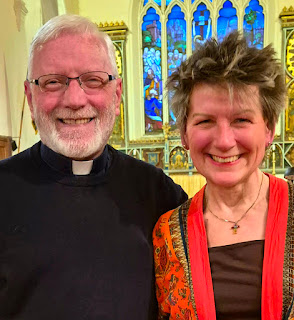Why Do You Call Me Good?
"Why do you
call me good?" asked Jesus. "No one is good - except God alone."
(Mark 10:18)
The woman said that her house isn’t good enough to receive a
priest, especially me because she said I am so holy. The way I say Mass. I’m
not holy I insisted. I’m a sinner and your house is perfectly fit for me or any
priest. You’re not a sinner, she said. I am, I said! But she wouldn’t hear of
it. A common mistake, not just among devout Catholics but in society at large.
That’s why there is such shock when the people on pedestals are revealed to
have feet of clay and worse. Oftentimes, it is we who put them on pedestals.
It’s something that has bothered me most of my adult life
that many people’s perception of me is skewed, based on the outer appearance
and the fact that I generally treat others well. Generally a nice person who
has respect and reverence for the other. We were brought up to that. To be
mannerly and courteous. It’s second nature to us as a family and it is genuine
but within me there are layers of something different, less pleasant, sinful,
damaged. Some of it latent, some of it lived out.
I’m not going to confess the details of my sins here. That’s
been done already, continues to be done in the appropriate place. But I’m with
Jesus in the above quote from his encounter with the righteous and rich young
man. It’s what I would ask of anyone who claims that I am good or holy – Why do
you call me good? No one is good except God alone. It’s like what my mother
used to say to those of us of her children who struggled badly at times in our
lives. She would encourage us by saying that only Jesus is perfect, the rest of
us struggle with something.
The Gospel passage that set me up for the desert many years
ago is set in the palace of Herod, outwardly a whitewashed tomb and internally
a place of lust, vice, drunkenness, compromise, dishonesty, death. A place of
shadows - though it has the illusion of comfort, celebration, happiness. I
discovered that much of my own interior life had its dwelling place in such a
palace and, however much I knew that I had to get out of there, I was too
“safe” in it, too secure in the familiarity of it and afraid to move out of it.
The devil you know!
By contrast Jesus was offering me the clarity, purity and
emptiness of the desert. I baulked at the emptiness. How could I survive
without a cigarette, a drink, my fantasies? However much I loved Jesus then, it
seemed that He couldn’t compensate for the pleasure they offered, that he
wouldn’t numb the pain that these things masked and would not heal that pain.
There comes a moment of grace when you take responsibility
for your life and its pain and make the journey from addiction to grace, to
freedom. But you remain a sinner. I remain a sinner and it is one of the great,
surprising mysteries of life that God chooses and uses sinners for His
purposes. The repentant sinner, ever repentant – like King David, St. Peter,
St. Augustine. And Mary Magdalene who (contrary to common perception) isn’t
spoken of as a sinner in the Gospel but was delivered by Jesus of seven demons.
It means she was in a seriously bad state but delivered she was chosen by Jesus
to be the first Apostle of the Resurrection. The world doesn’t understand this
and perhaps the Church doesn’t either.
I am never shocked by the fact that people are capable of foul deeds. Not shocked but absolutely appalled by the deeds themselves. Not shocked because I know what I am capable of myself and I’m no position to cast stones at anyone.
My mother provided me with a very important lesson in Mercy.
Shortly before she died I decided to apologise for all the hurt I had done to
her. We had hurt each other over the years, inflicting lasting wounds, said
terrible things. I suspect that she thought I was only referring to the time when
my drinking reached crisis point but I was talking about all my life. Anyway,
she didn’t deny that I had hurt her. Instead she said of the hurts I had done,
“you more than made up for them!” That’s it in a nutshell – when we take
ownership of our sins, confess them, repent of them, then we can make up for
them in some way and move on into real Mercy.
My mother knew me so there was no smoothing over the cracks. She knew better than to call me good or holy but she also saw the good in me, the love that covers over a multitude of sins (1 Peter 4:8).




.jpg)


.jpg)



Comments
Post a Comment